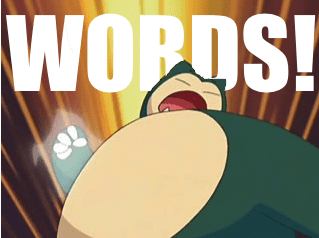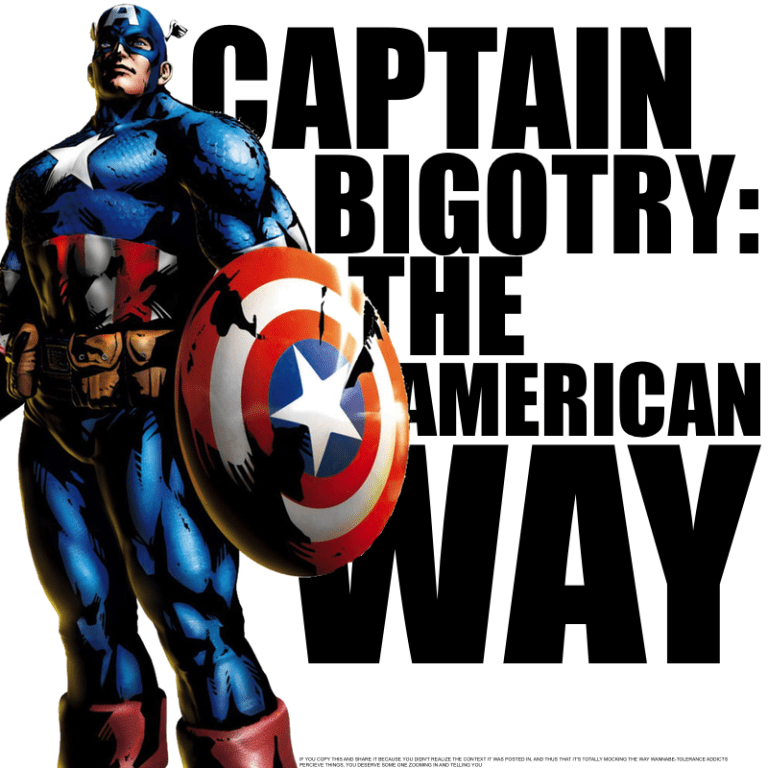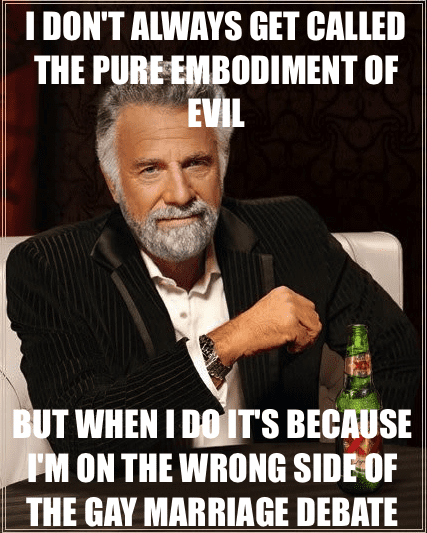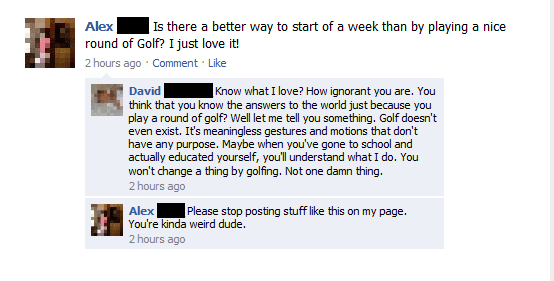Christians, Catholics, men and women with same-sex attraction, advocates of Gay Marriage and dissenters of the same:
The Gay Marriage debate is no debate. It has been rigged, framed and devalued into a series of pre-ordained slogans for each “side” to scream, to the point that entering into it now is less like having an argument and more like getting punched in the face by a Snorlax on crack.
There’s nothing quite as depressing, for the simple reason that everyone involved is obliged to defend abstractions and slogans instead of the Thing Itself; obliged to be awkward representations of “Movements” that don’t exist, instead of being human beings that do. Thus here’s 4 Ways the Gay Marriage Debate Has Been Rigged, so all said suckage may be sidestepped:
1. HATE!
This may come as a shock to you: Out of 28 states where constitutional amendments or initiatives that define marriage as the union of a man and a woman were put on the ballot in a voter referendum, voters in all 28 states voted to approve such amendments. Gay marriage has never been agreed to by the common people.
Now the reason this news might come as shocking is that, if you are at all engaged in the Great Fake Debate, you know that those who oppose gay marriage do so because they are brimming with Hate! for gay folks. We must conclude then, that the majority of Americans are hateful people.
Now I’m no optimist: I don’t have some overtly hopeful belief that all human beings are always their shiny-best. But the idea that the average man or woman who doesn’t support gay marriage does so out of hate (that is, “intense hostility and aversion usually deriving from fear, anger, or sense of injury”) is just silly. No offense, but most folk don’t have the energy to maintain a sense of intense hostility over abstract concepts. Yet this moral absolutism is the modus operandi of the gay Marriage Debate. And thus:
Seriously, I could probably advocate the killing of Jews on this blog and never receive a fraction of the laughably intense insults I do when I mention the G-A-Y word. (If you get a chance, and want to learn precisely how to rage-quit, check out the combox in my last post.)
Now the answer to this sixth-grade silliness is simple, it just requires making a definition. If love is taken in its classical sense — wanting the good of the beloved — then it’s difficult to say that those opposing gay marriage are writhing in epileptic hate-fits.
For we know that the gay lifestyle leads to a higher risk of HIV, depression, substance abuse, and a generally lower life expectancy. To oppose the normalization of a lifestyle that leads to this degradation of the human person — specifically the same-sex attracted person — is no hate at all, but a love. Not a love most people want, but a desire for the good of the beloved nonetheless.
To be clear, I don’t believe the majority of Americans are making this argument when they oppose gay marriage. Most seem to have some general, innate, or religious concept of what works, and whether they’re wrong or right, they vote accordingly. And absolutely, many people are ignorant in their opposition of gay marriage — thus you get the “gay marriage isn’t in the Bible” non-argument, or the “homosexuality is unnatural” evasion.
But can we at least be honest, and admit that very few people who wish to retain the definition of marriage as the union between man and woman do so out of burning hatred? It’s entirely possible to love men and women with same-sex attraction and still oppose gay marriage. Shoot, it’s entirely possible to be a man with same-sex attraction and oppose gay marriage, as many following this blog will happily inform you.
But as it turns out, it’s easier to baptize your opponents into the Westboro Baptist Church than listen to them, just as it’s easier to christen people with same-sex attraction as “faggots” and “sinners” than it is to love them. And so it goes.
2. SCREW DEFINITIONS EVERYONE KNOWS WHAT I MEAN RIGHT YEAH WORDS WOOH!
I don’t know when it happened, but the language in which the Debate is currently framed has been entirely flushed of all meaning and significance. We are hollow men, stuffed man, and our words hold all the weight of whispers and straw.
The Christian says he supports “God’s plan for marriage” and he will be rightly damned as a theocrat for the phrase. But the deeper issue is that — by and large — he has no idea what God’s plan for marriage is. For the Christian divorces and remarries at the same rate as everyone else, despite Christ making it absolutely clear “what God has joined together, no human being must separate” (Mark 10:9). We use the phrase, “God’s plan,” but we use it as an abstract concept. How often do we remember that God’s plan for marriage is the submission of woman and the crucifixion of man, an icon revealing the embrace of Christ and His Church?
Sorry, Catholic spasm. I’ll make it better:

Onwards then:
Now the Gay Marriage Advocate, on the other hand, will say marriage is about love, not gender. Again, the issue here isn’t that the super-hip phrase is true or false, it’s that it is entirely empty. It doesn’t have the capacity for truth or falsehood — an attempt to define any of the nouns involved would burn the whole thing to the ground.
Marriage is left undefined. For if marriage is determined to be mere union, the question rises: Why then isn’t any communion of person considered marriage? You could narrow marriage to be the recognition of mutual, consensual love between two people, but then you’d have define love. What is love? (Baby don’t hurt me.) If love is defined as it has always been defined — wanting the good of the beloved — it becomes difficult to justify the normalization of a lifestyle that has not (as I previously mentioned) been shown to lead human beings to the good.
If love is simply a feeling, then it is subjective as a feeling. Love might as well be x, if it’s something that “you just know when you feel it.” And then we’d have to say, hold up, what kind of love? Because there are brothers who feel feeling x towards each other. They call it love, a mutual, consensual feeling, regardless of gender. So we have to define love as specifically erotic love. But then you have to define the erotic.

For in this case the erotic can no longer mean the sexual, as sexual love — by its biological nature — contains the inherent goal of reproduction and unity. So sexuality must be redefined to only contain the unitive aspect of sex — not the procreative. And at this point there’s at least 20 ways one could go about defining what sex is divorced from procreation. (Mutual pleasure of genital areas? Self-gift made manifest in orgasm? Bodily union involving at least one reproductive organ?) The end result is that sexuality and sex are left largely undefined.
And then, at the end of all this, we’ve got to define Gender. It’s a hopeless task from the get-go: Gender has been expanded in the last few years to include Asexual, Bisexual, Heterosexual, Homosexual, Pansexual, Intersexual (I apologize for those I can’t remember), and it doesn’t look to be settling any time soon.
So the phrase becomes: Marriage (by which I mean the erotic union of two people, without a clear definition for the erotic, or for the union) is about love (by which I mean x) not gender (by which I mean y).
So the Christian screams about that Undefined Plan, the Advocate screams about that Undefined Love, and we all leave pissed off, back to our websites, forums, and friends who will affirm us in our pre-existing beliefs. If we’re lucky, they’ll even give us some new puffy-white slogans to hurl. Ah yes, didn’t you know? We are fighting the Great Marshmallow War, the modern meeting of opposing vagaries, and since no one’s words mean anything at all, we resort to name-calling to make something resembling a dent.
And this pretty much applies to anything that gets shouted at a rally: Equal Rights For All, Hate Is Not A Family Value, Pro-Family, Pro-Marriage, Love is Gender-Blind, Sanctity of Marriage, Gay is Normal — these are days in which all people really need to hear is:
3. Playing Pretend
As any good propagandist will tell you, a complicated fight is just no good. To achieve one’s goals, one must strip away all details and present a picture of black and white. Thus:
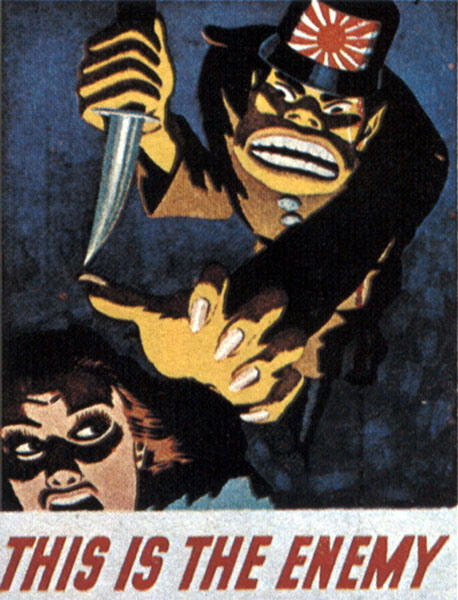
We’ve done precisely this with the gay marriage debate. The war has largely been painted — and please, stop me if it’s otherwise — like this: Gay folks want to get married, Christians aren’t letting them.
The first part is false. By and large, gay couples don’t want to get married. Obviously there isn’t universal data available yet, but from what we do know — based on studies from Hawaii, Massachusetts, Norway, Sweden and Holland — homosexual couples are less likely than heterosexual couples to get married or into any sort of civil-union-equivalent where available, and more likely to get divorced if they are.
Now one would think it’d be fair to say, “Well sure, not all gay couples want to get married, but all gay people want gay marriage to be legal,” and to a large extent:
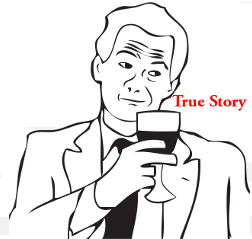
But this implies that the desire to legalize gay marriage isn’t so much about letting people do what they deeply want, as it is about culturally normalizing a lifestyle. And that’s complex.
There are men and women with same-sex attraction who don’t want gay-marriage legalized for this reason. There are same-sex attracted men and women who don’t want gay marriage because it’s an oppressive, patriarchal institution that should have died in the 60’s. In short, men and women with same-sex attraction aren’t the poor, mindless sheep, we’d love to treat them as. But that’s complex, so we don’t talk about that.
Similarly, not all Christians are against gay marriage. But we can’t discuss all this. “Most same-sex attracted people want, not marriage, but the ability to marry, and some Christians oppose this, for a diverse number of reasons” just ain’t a slogan we can rally around. And what the hell would we do if we didn’t have slogans?
4. The Objectified Gay Man
I talked about this in depth in this post, and it’d probably benefit the discussion more if everyone read it. But in brief, we’re all either attacking or defending a ghost (with marshmallows).
His name is Gay Man. If we stand up to defend a Gay Man, we can’t do it without defending the impression of Gay Men branded on our minds by Hollywood — that cute, kooky, best-friend-of-female-protagonist, whose great for dating advice, shopping, and entirely-safe emotional affirmation. In other words, we stand up to defend something roughly resembling a pet.

We defend the Gay Best Friend, as if a man with same-sex attraction were anything but a Man, a unique, resplendent creation endowed by God with dominion over the Earth, destined for infinite love, exalted above the angels, not only equal to heterosexual man, but a man who screws up just as much as him.
Similarly, if we attack a Gay Man, we can’t seem to attack him without the big looming “Sinner!” sign above his head. It’s easy to attack a man for a sin we suffer no temptation to commit ourselves, and thus we do it with all the boldness we might tell a man, “Your desire to smoke meth is disordered.” (Hey good one straight, white Christian, way to put yourself out there.) All this as if the sinner with same-sex attraction is anything but a Man, no better or worse a sinner than ourselves, saving our souls by the weight of his cross.
But the issue moves beyond either objectification. The real slap in the face of men and women with same-sex attraction is that very title: Gay. Gay as the defining essence of one’s being. As I’ve said before, the unique identity of man is not defined by where he wants to put his genitals, and it never will be. No wonder any dissent from the precepts of Gay Marriage is met with a cry of “Hate!”
If we objectify a man, narrowing him down to the word Gay, than a rejection of Gay actions becomes a rejection of him. No wonder we can scarcely do anything but scream:
What To Do?
Here I can only speak to the Catholic — I’ve got no clue what everyone else is going to do. In fact, everyone else, feel free to stop reading. If you’re in disagreement with me over the issue of gay marriage, don’t do anything. It’s obvious that the abstractions are in favor of legalizing gay marriage. Just keep at it, make everything black and white, hate vs. love, bigotry vs. tolerance, and perhaps we’ll all accept the error of our ways.
But Catholics are in a remarkable position within this debate. Marriage is a sacrament, a sacrament that will always be between a man and a woman. The Catholic Church will never recognize the court marriages of the 21st century, whether they are between men and women of the same sex or between heterosexual couples. Thus the Catholic is not in the position of excluding a certain group — the sacrament remains the sacrament and all else is sham.
When we engage the Marshmallow War then, it can only be with love for the human person. What else do we have at stake? The Sacrament of Holy Matrimony will not change. The culture? Yes, the culture may be devalued, but what is a culture but a community of unique human persons?
It seems we must only ever bother speaking if we are speaking to the human person. This means, first and foremost, burning our slogans. A slogan only ever means selling out to an abstract idea rather than actually caring. “I Support Traditional Marriage,” “Marriage = One Man One Woman,” “It’s Adam and Even Not Adam and Steve” (in fairness, I’ve never seen this in real life) “God’s Plan For Marriage….” It’s not that these things aren’t true, it’s that these things do not come of you, but from the great abstraction that is People Who Support Traditional Values.
We must see the Thing for the first time, like little children. We must see marriage, man, woman, and love as God sees them, and express ourselves as reacting authentically to those Truths. In this certain sense, we must become Poets, expressing Truth beautifully. If your honest reaction to the fact of Gay Marriage is “Support God’s Plan For Marriage,” then fine. Make a sign. Otherwise, put some meditation and prayer into it and speak.
Then we must define our terms. Luckily, the Catholic Church invented half the damn words we use in the first place. When we say Love, we have to mean Charity. We have to mean “a divinely infused habit, inclining the human will to cherish God for his own sake above all things, and man for the sake of God” and thus desire every man’s ultimate good, which is God. We must be catechized. (Practical advice: If there’s a phrase you use often, look up every single noun it contains in the Catechism, or here. If marriage is a sacrament that unites a man and a woman in God, what is a sacrament? Man? Woman? God? From there, what is human sexuality?)
Above all things, we must Love. This isn’t the part where I say, “I love gay people! Here, look at all my gay friends!” Because simply put, I’m bad at loving, period. To love is die for others. To love our enemies is to die for our enemies. This is not the phrase we should use when speaking to others about the Catholic understanding of Gay Marriage. This is the orientation of beings we should strive for. “Because I would die for you, I tell you…”
Only when we have ceased to argue for Traditional Values, and have begun to argue for love of that singular, human person — only then will anything change.
Yours.

